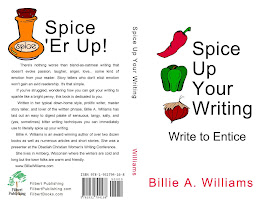Billie A Williams ©2007
Dictionary – does that word throw you into a tail spin or are you ready to sit down for a good read? This morning when I went to look up a word that just happened toward the back of the dictionary (tribute) I wanted to know the meaning for a project I was doing. Anyway, I opened my concise Oxford English Dictionary (this is a one volume tome that you can read without the magnifying glass that comes with my two volumes, slip cased tome.) This one has plenty in it, just not everything. In the back of this delicious piece of writer’s arsenal were some things I never bothered to look at thus far, called Appendixes —what could they possibly have that would not be in the dictionary right?
Well—an hour later I’m still enjoying these delights Collective Nouns — where you will find such things as a group of apes is called a shrewdness, a group of bears a sloth or sleuth— wouldn’t that be a quirky red herring for your mystery? A group of boys = a blush. Ha, not in this century. A group of cats a clowder or glaring or a group of wild cats would be a dowt or destruction — they don’t know my Lady Slipper she is a destruction force of one. Or did you know that a group of nuns is a Superfluity. Love that one. Wonder if Janet Elaine Smith thought to use that in her book Old Habits Die Hard, one of her Patrick and Grace Mystery Novels?
The Collection of Collective Nouns, while entertaining, is very useful for trivia contests, writing your novel or poem and more. These particular ones above are noted in the Concise OED are from the 15th century Proper Terms Book of St. Albans by Dame Juliana Barnes.
The list goes on but here is just a glance at what those appendix hold:
1. Countries of the world with capitals, square area, population, currency unit
2. Prime ministers of Great Britain, the United Kingdom, Canada, Australia, and New Zealand and Presidents of the USA.
3. Kings & Queens of England and the United Kingdom
4. Weights, Measures, and notations with conversions to metric, Fahrenheit and Celsius temperatures, metric prefixes with meanings and power notations.
5. Chemical Elements
6. The Greek Alphabet
7. The Solar System
8. Collective Nouns
9. Types of Language; formal, informal, archaic
10. English in Electronic communication – Abbreviations used for text messages cell phone or computer.
11. Guide to Good English
Dictionary – does that word throw you into a tail spin or are you ready to sit down for a good read? This morning when I went to look up a word that just happened toward the back of the dictionary (tribute) I wanted to know the meaning for a project I was doing. Anyway, I opened my concise Oxford English Dictionary (this is a one volume tome that you can read without the magnifying glass that comes with my two volumes, slip cased tome.) This one has plenty in it, just not everything. In the back of this delicious piece of writer’s arsenal were some things I never bothered to look at thus far, called Appendixes —what could they possibly have that would not be in the dictionary right?
Well—an hour later I’m still enjoying these delights Collective Nouns — where you will find such things as a group of apes is called a shrewdness, a group of bears a sloth or sleuth— wouldn’t that be a quirky red herring for your mystery? A group of boys = a blush. Ha, not in this century. A group of cats a clowder or glaring or a group of wild cats would be a dowt or destruction — they don’t know my Lady Slipper she is a destruction force of one. Or did you know that a group of nuns is a Superfluity. Love that one. Wonder if Janet Elaine Smith thought to use that in her book Old Habits Die Hard, one of her Patrick and Grace Mystery Novels?
The Collection of Collective Nouns, while entertaining, is very useful for trivia contests, writing your novel or poem and more. These particular ones above are noted in the Concise OED are from the 15th century Proper Terms Book of St. Albans by Dame Juliana Barnes.
The list goes on but here is just a glance at what those appendix hold:
1. Countries of the world with capitals, square area, population, currency unit
2. Prime ministers of Great Britain, the United Kingdom, Canada, Australia, and New Zealand and Presidents of the USA.
3. Kings & Queens of England and the United Kingdom
4. Weights, Measures, and notations with conversions to metric, Fahrenheit and Celsius temperatures, metric prefixes with meanings and power notations.
5. Chemical Elements
6. The Greek Alphabet
7. The Solar System
8. Collective Nouns
9. Types of Language; formal, informal, archaic
10. English in Electronic communication – Abbreviations used for text messages cell phone or computer.
11. Guide to Good English
All of this was fascinating, but then words are my stock in trade. I love them. That’s why Richard Lederer is such a treasure to me.
Then I decided to take a look at the introduction. I always read the introduction, preface, prologue in the front of books now. I never used to. I thought they were a waste of time. They certainly are not. The introduction to my Concise Oxford English Dictionary is a plethora of great information from how to use the dictionary (everyone knows that, right? You may want to think again) the way it is set up, the uses, and method of the whole book— to trade offs between Canadian English and American English; gas for petrol, braces for suspenders etc. There are 22 pieces of information that are contained in each word and definition if you understand what is presented there. My new rule – Never skip an Introduction the author or authors put it there for a reason.
And Speaking of writing - guess who is a guest blogger right here next week - Friday the 13th of April ? - my good friend and fellow author Joyce A. Anthony. She will stop by to talk about her new critcally aclaimed book that is taking the world by storm -- STORM. You won't want to miss her visit. Be sure to come by April 13, 2007.











No comments:
Post a Comment